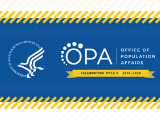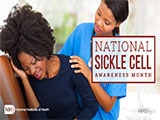What You Can Do to ‘Prevent to Protect’ Against Birth Defects
Being pregnant is a very special time in a mother’s life. A lot of time is spent planning for a baby’s arrival, from making sure to eat healthy foods and staying active to purchasing the safest car seat. Pregnancy is also a time when parents worry about their future child’s health and well-being.
One big worry parents may have is whether their child will have to start out life with a serious birth defect. According to the Centers for Disease Control and Prevention, 1 in 33 babies is born with a birth defect. While not all birth defects are preventable, a woman increases her chances of having a healthy baby by lowering her risk of infection before and during pregnancy.
January is National Birth Defects Prevention Month, and this year’s theme, “Prevent to Protect,” focuses on the importance of maintaining a healthy pregnancy to lower the probability of having a baby with a birth defect.
The first line of defense is the mother and her healthcare provider. A woman who is planning to conceive or is pregnant should consult her physician about any prescription or over-the-counter medications she is currently taking and nutrition, as well as any alcohol, drug and tobacco use. During her visit, she can be screened for any pre-existing conditions, including heart disease and diabetes and review her and her partner’s family health history to identify any potential risks.

A key priority is eating a healthy diet that includes the B vitamin folic acid. Getting 400 micrograms of folic acid every day at least a month before becoming pregnant can help prevent serious birth defects of the brain and spine.
Staying current on vaccinations is another important precaution to decrease the chances of transferring diseases from mother to fetus. Pregnant women should be vaccinated against whooping cough Tdap (tetanus-diphtheria-pertussis) and the flu during pregnancy to protect themselves and their baby. Women should receive vaccines such as the measles, mumps and rubella (MMR), a month or more before pregnancy. A healthcare provider should be consulted before receiving vaccinations.
Mosquitoes, mites and other disease vectors can be not only nuisances, but can also transmit illnesses through the blood stream that are harmful to the fetus. Some mosquito-borne diseases include malaria, Zika, dengue and chikungunya, all of which can exhibit mild to severe symptoms. To an unborn child, exposure to these diseases can lead to congenital infection, fetal brain defects, premature birth and, in some cases, death. In warm climates, mosquitoes can pose a hazard to pregnant women and their partners. Expectant mothers are warned to reduce their exposure to mosquito-borne infections by avoiding bodies of standing water, wearing cover up clothing at peak mosquito feeding times, using EPA-approved repellent, and staying in cool and well-screened areas.
Although not all birth defects can be prevented, the best weapons are education and prevention. By knowing the potential risks, taking the right precautions, and preventing exposure to certain infections, mothers can help prevent many birth defects and give their children the healthiest start in life possible.
For more information on reducing the risk of birth defects, please visit the National Center on Birth Defects and Developmental Disabilities at https://www.cdc.gov/ncbddd/index.html.
Alexa Canady: Black History in the Making
#IAmHHS: Finding the Essence of Public Service


